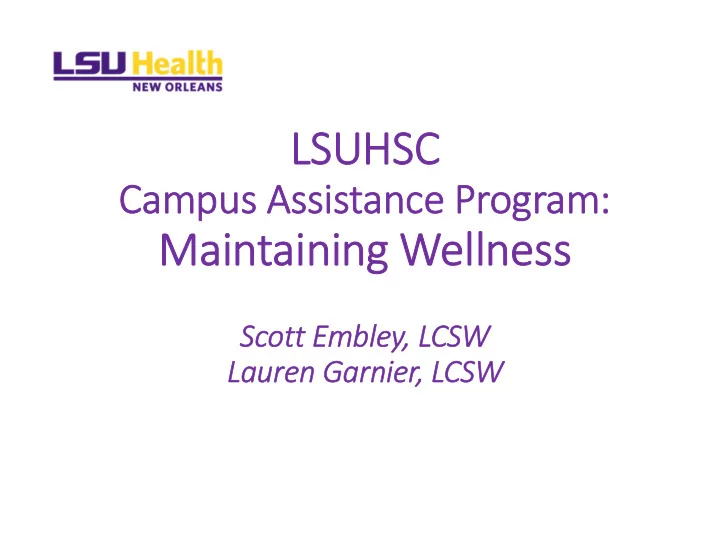

LSUHSC LSUHSC Cam Campus us Assis Assistance ance Pr Program: m: Main intain inin ing We Wellness Scott Embley, LCSW Lauren Garnier, LCSW
Campus Campus Assis Assistance ance Pr Program Campus Assistance Program Clinical Education Building, 8 th Floor Office 866 1542 Tulane Avenue New Orleans, LA 70112 (504) 568 ‐ 8888 cap@lsuhsc.edu https://www.lsuhsc.edu/ ▪ search “cap”
CAP
CAP
Re Research • Medical residents experience higher rates of depression than the general public o Contributing factors include demanding environment, poor sleep patterns, limited independence in decision ‐ making, and exposure to intense emotional situations • 2015 Meta ‐ analysis of over 50 resident studies showed the average prevalence of depression and/or depressive symptoms at over 28%, with some studies at up to 43% • Resident depression has been linked to poor ‐ quality patient care and increased medical errors Mata DA, Ramos MA, Bansal N, Khan R, Guille C, Di Angelantonio E, Sen S. Prevalence of Depression and Depressive Symptoms Among Resident Physicians: A Systematic Review and Meta ‐ analysis. JAMA. 2015;314(22):2373 ‐ 2383. doi:10.1001/jama.2015.15845
Burnout Burnout Ra Rates tes by by Spe Specialty: ialty: • Me Mean = >50% >50% • IM IM = >55% >55% • FM FM = >60% >60% Shanafelt, Tait D. et al. Changes in Burnout and Satisfaction With Work ‐ Life Balance in Physicians and the General US Working Population Between 2011 and 2014 Mayo Clinic Proceedings , Volume 90 , Issue 12 , 1600 ‐ 1613
Le Letter er fr from ACGME ACGME CE CEO “Layered on top of [work ‐ related] challenges is the stigma that many physicians in training and in practice encounter related to acknowledging that they need help, and to feeling supported and safe in asking for that help. Physicians and other health care providers act as caregivers, but we don't always take care of ourselves. We need to be well, both physically and emotionally, in order to best serve our patients. The culture of medicine needs to support those seeking help.” ‐ Thomas Nasca, CEO of ACGME International 8/23/16
ACGME ACGME Re Resources • Burnout inventory / self ‐ assessment • Well ‐ being inventory for programs & organizations • Webinar: “Combating Burnout, Promoting Physician Well ‐ being” • Videos, research articles, educational modules, symposium presentations, toolkits, etc. • “Make the Difference: Preventing Medical Trainee Suicide” video (also linked on CAP website) http://www.acgme.org/What ‐ We ‐ Do/Initiatives/Physician ‐ Well ‐ Being/Resources
Wh What at is is Str Stress? ss? In a biological or medical context, stress is a physical, mental, or emotional factor that causes bodily or mental tension. Stress can be external (environmental) or internal (psychological)
Str Stress ss – E – Emotional Sympto mptoms ms • Moodiness • Feeling overwhelmed • Irritability or short temper • Agitation or inability to relax • Constant worrisome thoughts • Sense of loneliness and isolation General unhappiness or depression •
Str Stress ss – C – Cognitive Symptoms mptoms • Poor memory • Poor judgment • Inability to concentrate • Negative thought process • Ruminating or racing thoughts
Str Stress ss – P – Physical Symptoms mptoms • Fatigue or exhaustion • Muscle tension • Headaches • Dizziness • Chest pain • Rapid heartbeat Frequent illnesses • Gastrointestinal distress •
Str Stress ss – B – Behavioral Symptoms mptoms • Change in appetite • Insomnia or hypersomnia • Isolating yourself from others • Nervous habits (nail biting, hair pulling, etc.) • Using alcohol, nicotine, or prescription/ illegal drugs to relax • Procrastination or neglect of responsibilities • “Lashing out” towards others in anger
Eus Eustress ss vs vs. Di Distress ss
Str Stress ss and and yo your Br Brain ain • Brain senses danger (stress) • Amygdala sends signal to hypothalamus • Sympathetic nervous system engaged • Pre ‐ frontal cortex overridden o Insight o Concentration o Judgment o Planning o Memory retrieval o Decision ‐ making o Impulse control Scientific American (April 2012), 306 , 48 ‐ 53 Published online: 20 March 2012 | doi:10.1038/scientificamerican0412 ‐ 48
Basi Basic Needs Needs • Healthy diet – food is FUEL for your body. What kind of fuel are you using? • Exercise – one of the best strategies to maintain our physical and mental health. • Sleep hygiene – control your sleep environment. • Monitor what you put into your body – alcohol, caffeine, nicotine, stimulants, etc. because relaxation or energy benefits are temporary!!
Emoti Emotional nal Ma Manage geme ment nt Cognitive Behavioral Theory Triggering Control Event your thoughts in order to manage your feelings and behavior
Re Relaxa xation Response sponse • Parasympathetic nervous system must be actively engaged in times of excessive stress: o Deep breathing o Exercise (yoga, tai chi) o Meditation & mindfulness o Progressive muscle relaxation o Whatever helps you relax: warm bath, taking a walk, playing with pets, etc.
Lif Life Bal Balance nce Recreation Faith Socialization Relaxation WORK Relationships Family
Factors of Fa of Resilie silience HEALTHY COPING UNHEALTHY COPING • Drugs/alcohol • Sleep • Eating/sleeping too much • Nutrition or too little • Exercise • Avoiding socialization & recreation activities • Socialization • Anger/verbal or physical • Recreation violence • Ruminating about • Relaxation negative thoughts
Fa Factors of of Resilie silience • Support system o Family o Friends o Faith o Fellow residents o Faculty mentor o Professional resources
Re Resources • www.helpguide.org/ • www.apa.org/helpcenter/ • www.mindful.org/
THANK THANK YO YOU CAMPUS ASSISTANCE PROGRAM (504) 568 ‐ 8888 ▪ cap@lsuhsc.edu https://www.lsuhsc.edu/ ▪ search: CAP “If your compassion does not include yourself, it is incomplete.” - Jack Kornfield– Author & Buddhist Practitioner
Recommend
More recommend